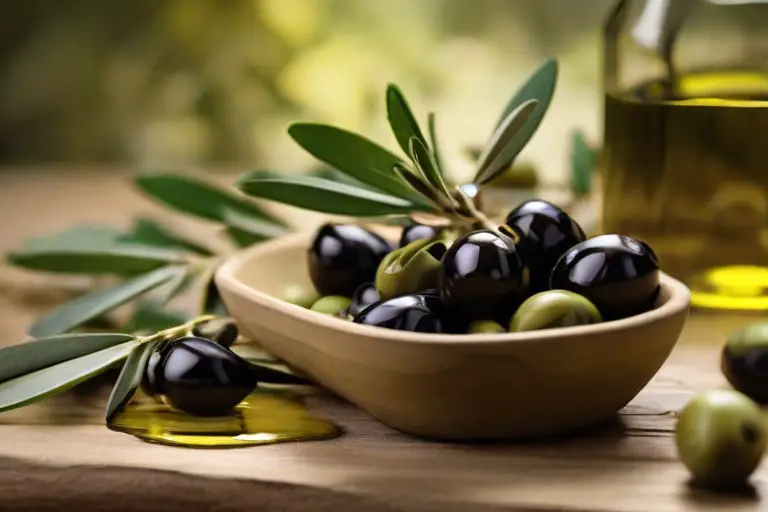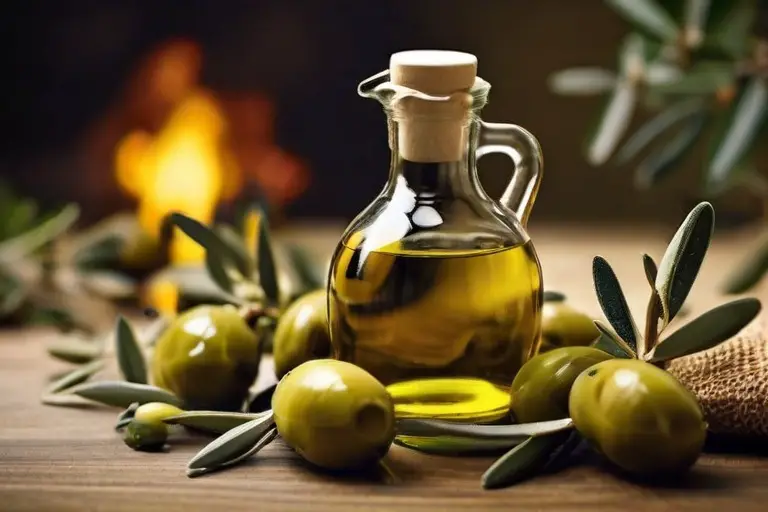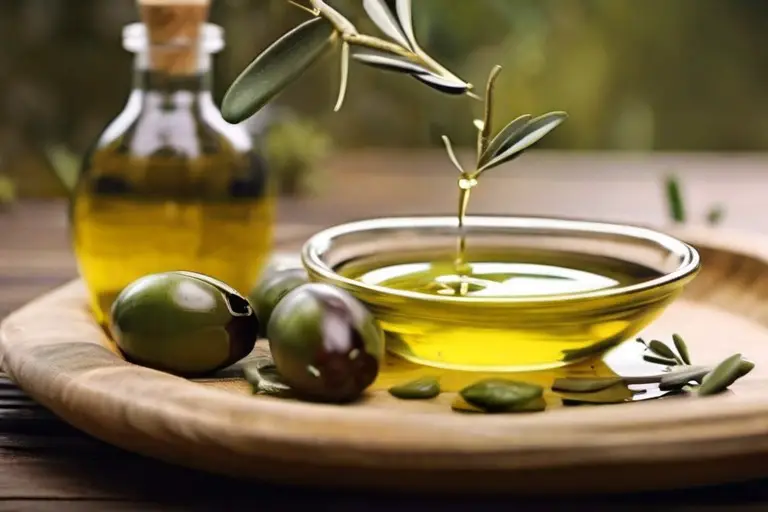Olive oil is a popular cooking oil known for its health benefits and rich flavor. But have you ever wondered if it is biodegradable? As we become more conscious of our environmental impact, it’s important to consider the biodegradability of the products we use. In the case of olive oil, it is indeed biodegradable.
This means that it can be broken down naturally by microorganisms in the environment, making it a more eco-friendly option compared to non-biodegradable cooking oils. In this article, we will explore the biodegradability of olive oil and its impact on the environment, as well as the importance of choosing biodegradable products in our daily lives.
How eco-friendly fuel is made from olive waste
When it comes to biodegradability, olive oil is a bit of a mixed bag. On the one hand, it is an all-natural product made from plants, so you would think that it would be easily broken down by nature. On the other hand, olive oil is quite dense and viscous, which means it can take longer to degrade than other materials.
So what’s the verdict? Is olive oil biodegradable? The answer is yes but with some caveats. If you pour pure olive oil into soil, it will eventually break down – although this process can take months or even years. However, if Olive Oil is mixed with other waste products (such as in a landfill), its degradation will be significantly slowed down. There are also some environmental concerns to consider when disposing of used olive oil.
For example, used cooking oil should never be poured down the drain as it can clog pipes and lead to sewage overflows. Instead, always dispose of used cooking oils in the trash – preferably in a sealed container to prevent leaks.
Is Cooking Oil Biodegradable
We all know that cooking oil is a necessary part of many recipes. But what happens to it after we’re done cooking? Most people just pour it down the drain, but is that really the best way to get rid of it?
It turns out that used cooking oil can actually be recycled and turned into biodiesel. Biodiesel is a renewable fuel that can be used in any diesel engine. It’s made by combining alcohol with vegetable oil or animal fat.
The process of making biodiesel is called transesterification. During this process, the triglycerides in the oil are broken down into glycerol and fatty acids. These fatty acids can then be combined with an alcohol to create biodiesel.
Biodiesel has a number of advantages over regular diesel fuel. It’s renewable, so it doesn’t contribute to climate change like fossil fuels do. It’s also biodegradable, so it won’t pollute our waterways like petroleum products can.
And because it’s made from plant materials, it actually helps reduce greenhouse gases instead of contributing to them.
So if you’re looking for a way to dispose of your used cooking oil, consider recycling it into biodiesel!

How to Dispose of Olive Oil
If you’re like most people, you probably have a bottle of olive oil sitting in your pantry. And while olive oil is healthy to cook with, it can be tough to know how to dispose of it properly. Here’s a quick guide on how to dispose of olive oil:
1. Pour the used olive oil into a sealable container. Glass jars work well for this.
2. Label the container with the date and type of oil so you know when it was used and what’s inside.
3. Take the sealed container to your local recycling center that accepts cooking oils.
Is Cooking Oil Hazardous
Most people don’t think twice about cooking with oil, but did you know that it can actually be quite dangerous? Here’s what you need to know about the hazards of cooking with oil. Oil is highly flammable, which means it can easily catch fire if it gets too hot.
If you’re not careful, a kitchen fire could start very easily when cooking with oil. Additionally, breathing in the fumes from heated oil can also be harmful. When inhaled, these fumes can irritate your lungs and cause difficulty breathing.
In extreme cases, they can even lead to pneumonia or other serious respiratory problems. So what should you do to stay safe when cooking with oil? First and foremost, always use caution when heating oil on the stovetop.
Keep a close eye on it, and never leave it unattended. Additionally, make sure your kitchen is well-ventilated to help reduce the risk of inhaling any harmful fumes. If you follow these safety tips, then you can enjoy cooking with oil without putting yourself at risk. Just remember to always use caution and stay safe!

Dumping Cooking Oil in the Ground
Dumping cooking oil in the ground may seem like an easy and environmentally friendly way to dispose of it, but it can actually cause a lot of damage. When cooking oil is dumped into the ground, it can seep into groundwater and contaminate it. This can lead to water shortages and health problems for people who rely on that groundwater for drinking, bathing, and cooking.
Cooking oil can also clog sewer lines and drainage systems, which can cause flooding. So next time you’re finished cooking with oil, be sure to dispose of it properly!
What to Do With Old Oil Cooking
If you’ve got some old oil that’s been sitting around and you’re not sure what to do with it, don’t throw it out! There are actually a few different ways you can use it. Here are a few ideas:
Use it to fry up some food: Old oil isn’t the best for healthy cooking, but it can still be used for things like French fries or chicken nuggets. Just be sure to watch the temperature so the oil doesn’t get too hot, and start smoking.
Add it to your compost pile: Cooking oil is great for composting since it helps break down other materials. Just make sure you mix it in well so it doesn’t attract rodents.
Use it as a lubricant: If you’ve got some squeaky door hinges or creaky floorboards, a little bit of old cooking oil can help Silence them. Just apply a small amount and work it in until the noise goes away. Do you have any other ideas for uses for old cooking oil? Share them in the comments below!
What to Do With Leftover Oil from Frying
If you have leftover oil from frying, don’t pour it down the drain! Here are some tips for what to do with it instead. First, let the oil cool completely. Once it’s cooled, you can either reuse it or dispose of it. To reuse the oil, strain it through a coffee filter or cheesecloth into a clean container. Store the strained oil in a cool, dark place and use it within a month or two. If you want to get rid of the oil, pour it into a sealable container and put it in the trash. Don’t pour hot oil down the drain – this can damage your pipes!

Reusing Olive Oil
Reusing olive oil is a great way to save money and reduce waste. Here are some tips on how to do it:
1. Store leftover olive oil in a dark, cool place.
2. When you’re ready to use it again, strain the oil through a coffee filter or cheesecloth to remove any impurities.
3. Use the strained oil within a week or two for best results.
4. Olive oil can be reused multiple times, so don’t throw it out after just one use!
Is Paper Wrapper Biodegradable
Paper wrappers are made from paper, which is a natural and renewable resource. Paper is also recyclable, so it can be reused many times. However, when paper wrappers are discarded, they often end up in landfills.
Fortunately, paper wrappers are biodegradable, so they will eventually break down and return to the earth. This process happens when microbes in the environment consume the cellulose in the paper and convert it into carbon dioxide and water.
The time it takes for a paper wrapper to decompose depends on several factors, such as the type of paper used, the thickness of the wrapper, and exposure to sunlight and moisture.
In general, though, most paper wrappers will decompose within a few months to a couple of years.
So if you’re looking for a eco-friendly way to packaging your products, consider using paper wrappers! Not only are they sustainable and biodegradable, but they can also be recycled or reused.

Credit: www.amazon.com
Is Olive Oil Environmentally Friendly?
Yes, olive oil is environmentally friendly. It is made from a renewable resource, olives, and does not require any harsh chemicals or solvents to extract. Plus, olive oil has a number of environmental benefits:
1. Olive oil can help reduce soil erosion.
2. Olive trees provide habitat for birds and other wildlife.
3. Olive oil can be used as a biodegradable lubricant.
4. Burning olive oil produces less air pollution than burning fossil fuels like coal or natural gas.
Can Olive Oil Be Composted?
Olive oil is a natural product that can be composted. However, it is important to note that olive oil will only decompose in anaerobic conditions, so it is important to make sure that your compost pile or bin has little or no oxygen. If you are not sure whether your compost pile is anaerobic, you can add a small amount of olive oil to a test tube of water and seal the tube with a cork.
After 24 hours, check the tube to see if the olive oil has risen to the top of the water. If it has, then your compost pile is anaerobic, and you can add olive oil to it.
Is Olive Oil Good for the Ground?
Yes, olive oil is good for the ground. It enriches the soil with nutrients and helps retain moisture, which is beneficial for plant growth.
Why Should You Not Throw Away Olive Oil?
Olive oil is a healthy, monounsaturated fat that has many benefits for your body and mind. It’s also a natural product with a long shelf life. However, there are some things you should know about olive oil before you start cooking with it or throwing it away. Here are four reasons why you should not throw away olive oil:
1. Olive Oil Is Good For Your Heart Studies have shown that olive oil can help reduce the risk of heart disease by lowering cholesterol levels and improving blood vessel function. Additionally, the antioxidants in olive oil can help protect against oxidative damage, which is linked to an increased risk of heart disease.
2. Olive Oil Can Help You Lose Weight If you’re trying to lose weight, olive oil can be a helpful addition to your diet. The monounsaturated fats in olive oil can help you feel full and satisfied after meals, so you’re less likely to overeat or snack between meals. Additionally, the antioxidants in olive oil may help boost your metabolism and burn more calories throughout the day.
3. Olive Oil Can Improve Your Brain Health. The healthy fats in olive oil can support cognitive health and improve brain function as we age. Additionally, the antioxidants in olive oil may help protect against age-related decline in brain function, such as Alzheimer’s disease or dementia.
Frequently Asked Questions [FAQs]
Is olive oil biodegradable?
Yes, olive oil is biodegradable. When disposed of properly, it can break down naturally over time, especially in a compost pile or other biodegradation processes.
What is the difference between biodegradable and compostable?
Biodegradable items can break down and return to nature, but not necessarily in a compost pile. Compostable items, on the other hand, degrade into compost and contribute to the growth of plants and soil health.
Can olive oil be composted?
Yes, olive oil can be composted, but it should be done carefully in small amounts in a well-managed compost pile to avoid causing an imbalance in the decomposition process.
What are the future perspectives of olive oil biodegradation?
The future perspectives of olive oil biodegradation include exploring its potential for use in biodegradable and compostable products, as well as finding innovative ways to integrate it into waste treatment processes for environmental benefits.
What are the benefits of using olive oil in composting?
Olive oil can contribute to the breakdown of organic materials in a compost pile and can also help to emulsify other substances, making it beneficial for certain aspects of the composting process.
Can vegetable oil be composted?
Yes, vegetable oil, including olive oil, can be composted in small amounts. However, using large amounts of vegetable oil in composting should be approached with caution to avoid creating hydrophobic conditions or causing imbalances in the compost pile.
Conclusion
Olive oil is indeed biodegradable, making it a more eco-friendly option compared to many synthetic oils. Its natural composition allows it to break down and return to the environment without causing harm or lasting pollution. This, coupled with its numerous health benefits, makes olive oil an excellent choice for cooking, skincare, and other uses.
So, the next time you reach for oil, consider choosing olive oil – not just for your own well-being, but for the planet’s too. After all, isn’t it wonderful to know that we can enjoy the benefits of this golden elixir without compromising the health of our planet? So, we ask you again, is olive oil biodegradable? And now, you know the answer.
